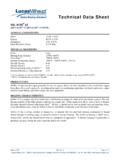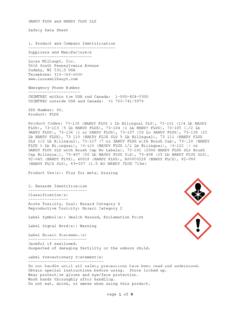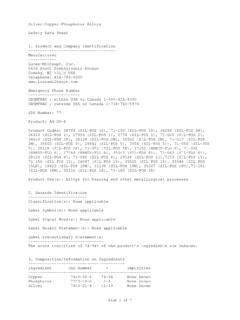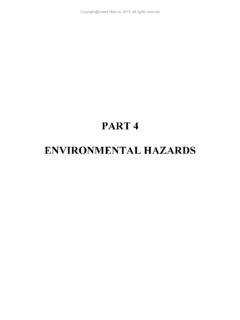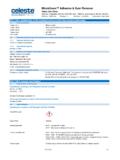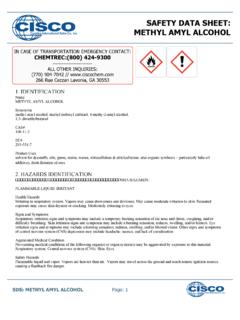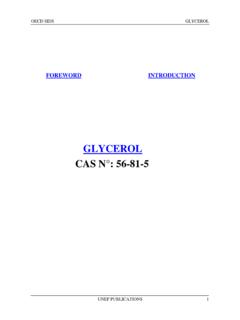Transcription of Silver-Copper-Phosphorus Alloys Safety Data Sheet Lucas ...
1 Silver-Copper-Phosphorus Alloys Safety data Sheet 1. Product and Company Identification ------------------------------------- Suppliers and Manufacturers --------------------------- Lucas Milhaupt, Inc. 5656 South Pennsylvania Avenue Cudahy, WI 53110 USA Telephone: 414-769-2000 Emergency Phone Number ---------------------- Chemtrec: 800-424-9300 SDS Number: 77 Product Codes: 15-996; 21-015; 24-863; 67-150; 71-017; 71-020; 71-050; 71-052; 71-060; 71-061; 71-062; 71-063; 71-100; 71-150; 71-180; 71-181 Product Use(s): Alloys for brazing and other metallurgical processes 2. Hazards Identification ------------------------- Classification(s): None applicable Label Symbol(s): None applicable Label Signal Word(s): None applicable Label Hazard Statement(s): None applicable Label Precautionary Statement(s) -------------------------------- <1-93% of the products consist of ingredients of unknown acute toxicity.
2 3. Composition/Information on Ingredients ---------------------------------------- - Ingredient CAS Number % Impurities ---------------------------------------- --------------- copper 7440-50-8 <1-93 None known phosphorus 7723-14-0 < None known silver 7440-22-4 < None known 4. First Aid Measures --------------------- Eye --- Flush affected areas with water for at least fifteen minutes. Seek medical assistance if necessary. Skin ---- Remove contaminated clothing. Wash affected area with large quantities of water for at least five minutes. Seek medical attention if necessary. Launder or dry-clean clothing before reuse. Ingestion --------- If subject is conscious, induce vomiting. If unconscious or convulsive, seek immediate medical assistance.
3 Do not give anything by mouth to an unconscious or convulsive person. Inhalation ---------- If signs and symptoms of toxicity are observed, remove subject from area, administer oxygen, and seek medical attention. Keep the subject warm and at rest. Perform artificial respiration if breathing has stopped. Note to Physician ----------------- None of the components are acutely toxic by ingestion, nor are they absorbed through the skin. Long-term chronic exposure may cause argyria. 5. Fire Fighting Measures ------------------------- Fire and Explosion Hazards -------------------------- These products are non-flammable and non-explosive. If present in a fire or explosion, they may emit fumes of the constituent metals and/or phosphorus pentoxide. Extinguishing Media ------------------- Use dry chemical.
4 Do not use water. Fire Fighting Instructions -------------------------- If fighting a fire in which these products are present, wear a self-contained breathing apparatus with full facepiece operated in pressure-demand or other positive pressure mode. 6. Accidental Release Measures ------------------------------ Methods and Materials --------------------- If a finely-divided form of product is spilled, clean up spillage so as to minimize dispersion of dust. Either wet sweeping or vacuuming using HEPA filtration is recommended. Personal Precautions -------------------- Avoid contact with skin, eyes, and mucous membranes. Environmental Precautions ------------------------- Prevent spills from entering sewers or contaminating soil. 7. Handling and Storage ----------------------- Handling Precautions -------------------- No special handling precautions are required.
5 Work and Hygiene Practices -------------------------- To prevent ingestion following use of the product, wash hands and face before eating, drinking, applying cosmetics, or using tobacco. Remove contaminated clothing or protective equipment before entering eating/drinking areas. Storage Precautions ------------------- Do not store in proximity to incompatible materials (see Section #10). 8. Exposure Controls and Personal Protection ---------------------------------------- ---- Ingredients - Exposure Limits ----------------------------- copper ACGIH TLVs: mg/m3 TWA (fume); 1 mg/m3 TWA (dusts and mists) OSHA PELs: mg/m3 TWA (fume); 1 mg/m3 TWA (dusts and mists) phosphorus No applicable ACGIH TLV(s) No applicable OSHA PEL(s) silver ACGIH TLV: mg/m3 TWA (metal) OSHA PEL: mg/m3 TWA Ingredients Biological Limits ------------------------------- copper No ACGIH BEI(s) or other biological limit(s) phosphorus No ACGIH BIE(s) or other biological limit(s) silver No ACGIH BEI(s) or other biological limit(s) Engineering Controls -------------------- Use dilution or local exhaust ventilation adequate to maintain concentrations of all components and their byproducts to within their applicable standards.
6 Eye/Face Protection ------------------- Wear eye protection adequate to prevent eye contact with the product and injury if the product is used with a flame. Plastic-frame spectacles with side shields and filter lenses (shade #3/#4) are recommended. Skin Protection --------------- Wear protective gloves and clothing to prevent skin injuries if the product is used with a flame and/or for prolonged or repeated contact with finely-divided forms of product. Avoid flammable fabrics. Respiratory Protection ---------------------- If an exposure level to a component(s) exceeds an applicable standard, use a NIOSH-approved respirator having a configuration (facepiece, filter media, assigned protection factor, etc.) effective for the concentration of the component(s) generated. For guidance on selection and use of respirators, consult American National Standard (ANSI, New York, NY 1003, USA).
7 9. Physical and Chemical Properties ----------------------------------- Appearance: Light- copper metals, various forms Odor: none Odor threshold: not applicable pH: not applicable Melting Point: > Freezing point: not applicable Boiling point/boiling range: not determined Flash Point: not applicable Evaporation Rate: not applicable Flammability Class: not applicable Lower Explosive Limit: not applicable Upper Explosive Limit: not applicable Vapor pressure: not applicable Vapor density: not applicable Relative density (H2O): Solubility (H2O): insoluble Oil-water partition coefficient: not applicable Autoignition Point: not applicable Decomposition temperature: not applicable Viscosity: not applicable 10. Stability and Reactivity ---------------------------- Reactivity: none reasonably foreseeable Stability: stable Hazardous Polymerization: will not occur Risk of Dangerous Reactions: see Conditions to Avoid Conditions to Avoid ------------------- silver and copper can form unstable acetylides in contact with acetylene gas.
8 Incompatible Materials ---------------------- Strong oxidizers; ammonia; azides; nitric acid; ethylene imine; sulfuric acid; chlorine trifluoride; inorganic and organic peroxides; peroxyformic acid; oxalic acid; bromates, chlorates, and iodates of alkali and alkali earth metals; tartaric acid; 1-bromo-2-propyne; permonosulfuric acid; alkaline hydroxides. Hazardous Decomposition Products -------------------------------- Heating to elevated temperatures may liberate fumes of the constituent metals and/or phosphorus pentoxide. 11. Toxicological Information ----------------------------- This product has not been subject to toxicological testing by the manufacturer/supplier. <1-93% of the products consist of ingredient(s) of unknown acute toxicity. Ingredients - Toxicological data -------------------------------- copper LD50: No data available LC50: No data available phosphorus LD50: >15,000 mg/kg (oral/rat) LC50: 4,300 mg/m3 for 1 hr (rat) silver LD50: >2,000 mg/kg (oral/rat) LC50: No data available Primary Routes(s) of Entry -------------------------- Ingestion; inhalation.
9 Eye Hazards ----------- Eye contact with these products in finely-divided forms may cause irritation, conjunctivitis, ulceration of the cornea, and/or argyria, a permanent gray discoloration of the eyes, skin, mucous membranes, and respiratory tract. Skin Hazards ------------ Skin contact with these products, particularly in finely-divided forms, may cause irritation, argyria, discoloration, and/or contact dermatitis. Ingestion Hazards ----------------- Ingestion of these products in finely-divided forms may cause nausea, vomiting, and gastrointestinal irritation. Inhalation Hazards ------------------ Inhalation of toxicologically-significant quantities of the components is unlikely when the product is used in accordance with instructions and specified protective measures (see Section #8). When phosphorus is overheated in air, it is converted to phosphorus pentoxide, which is corrosive and irritating to eyes, nose, throat, and mucous membranes.
10 Symptoms Related to Overexposure -------------------------------- Pre-existing pulmonary diseases ( , bronchitis, asthma) may be aggravated by inhalation overexposure, particularly as fume. Delayed Effects from Long Term Overexposure ---------------------------------------- --- Chronic overexposure by inhalation and/or ingestion may aggravate pre-existing diseases of the liver, kidneys, and gastrointestinal system. Carcinogenicity --------------- The product contains no chemicals classified as potential or demonstrated carcinogens by IARC, NTP, or OSHA. Germ Cell Mutagenicity ---------------------- The product contains no chemicals determined to be germ cell mutagens. Reproductive Effects -------------------- The product contains no chemicals determined to be damaging to fertility of the unborn child.
